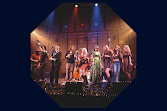There was a time when the classical music world’s attitude to pop music was one of condescension, considering it simple, commercial, or disposable. Likewise, the pop music world viewed classical music as elitist, inaccessible, or out of touch with current culture. Thankfully for music lovers, these attitudes have been eroded by more open, genre-fluid thinking, as many musicians and listeners have rejected that binary altogether, resulting in an increasingly hybrid and inclusive musical world.
So, we come to tonight’s show: The Liverpool Songbook - star singers from the West End, the Royal Liverpool Philharmonic Orchestra, and a set of tunes written by pop musicians for a truly hybrid and inclusive evening of song, celebrating Liverpool’s rich musical history.
Conducted by Richard Balcombe, the Royal Liverpool Philharmonic Orchestra opened with a Liverpool medley comprising ‘In My Liverpool Home’, ‘Liverpool Lou’, ‘Penny Lane’ and ‘Magical Mystery Tour’. At the end of this, the evening’s host, radio presenter, music journalist, and author Spencer Leigh, came on stage to set the scene, provide a little context for each of the tunes we had just heard, and introduce the singers: Graham Bickley, Patrick Smyth, and Laura Tebbutt.
The songbook proper got underway with Smyth taking lead vocals on Billy Fury’s ‘Wondrous Place’, Bickley singing the Lightning Seeds’ ‘Life of Riley’, and Smyth again on The Coral’s ‘Dreaming of You’. Host Spencer Leigh returned to the stage to introduce the next sequence of songs: Elvis Costello’s ‘Veronica’ (co-written with Paul McCartney), The Real Thing’s ‘You to Me Are Everything’, and ‘Tell Me It’s Not True’ from Willy Russell’s musical Blood Brothers, on which Laura Tebbutt took the lead. Her powerful and thoroughly captivating performance brought the audience to its feet.
Leigh entered the stage again to introduce the songs that would take us to the interval: The Beatles’ ‘Here Comes the Sun’, an instrumental version of Gerry and the Pacemakers’ ‘Ferry ‘Cross the Mersey’, highlighting its melodic beauty and conveying the nostalgia of a distant time and place, Pete Wylie’s ‘Heart As Big As Liverpool’, and Paul McCartney’s Live and Let Die.
The second half began with a medley of Liverpool-related television themes: Z Cars (greeted with a mixed chorus of cheers and boos due to its association with Everton FC), Brookside, Bread, and The Liver Birds. Leigh introduced the next group of songs, all relating to the punk era and Eric’s Club: OMD’s ‘Enola Gay’, Frankie Goes to Hollywood’s ‘The Power of Love’, and Echo and the Bunnymen’s ‘The Killing Moon’. Smyth and Bickley had their best moments with the latter two songs.
Patrick Smyth sang The Farm’s ‘All Together Now’, encouraging the audience to sing and sway along. The night’s standout moment came with Laura Tebbutt’s incredibly powerful rendition of Cilla Black’s ‘You’re My World’, for which she received a standing ovation. The La’s ‘There She Goes’ and The Zutons’ ‘Valerie’ followed.
Much to the audience’s delight, Leigh introduced the former frontman of Pele and Amsterdam, the “Scouse Springsteen” himself, Ian Prowse, who performed his classic ode to Liverpool, ‘Does This Train Stop’ on Merseyside. The songbook concluded with an instrumental version of John Lennon’s ‘Imagine’ and ;Now and Then’.
After a thoroughly deserved standing ovation, conductor Balcombe and the singers returned to the stage for an encore featuring ‘In My Liverpool Home’, ‘The Leaving of Liverpool’, and The Beatles’ ‘Hey Jude’, for which Ian Prowse rejoined them.
This show proved once and for all that pop and classical music can come together to allow the listener to hear familiar songs in a new and enhanced way. I’m sure those behind this performance are already working on The Liverpool Songbook 2. After all they have a musical A to Z to chose from; A Flock of Seagulls to The Zutons.
A nice postscript to the evening was a Q&A with Richard Balcombe and Spencer Leigh, chaired by Richard Haswell, Head of Programme (Hall and Events) at the venue. Balcombe said that, working in the classical field, pop music had largely passed him by, so this experience had been a revelation. He hoped his arrangements had highlighted the original songs rather than obscuring them. There is no doubt he had certainly achieved that.
Reviewer – Adrian Cork
On – 28.06.2025













